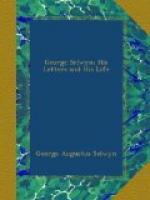* Carlisle and Byron were not only guardian and ward, but were nearly related; it is a singular fact that Carlisle declined to introduce him in the house of Lords.
Selwyn’s letters open with the departure of Lord Carlisle for the Continent. The young peer was then not quite twenty, but had fallen desperately in love with Lady Sarah Bunbury. This beautiful and attractive woman had half London at her feet, including the King. For obvious constitutional reasons it was impossible for him to marry her, but day after day the town told how he used to ride to and fro in front of Holland House to catch a glimpse of Lady Sarah. At the drawing room after the royal marriage, at which, by the wish of the King, she was first bridesmaid, Lord Westmoreland, who was an adherent of the Stuarts, knelt to Lady Sarah, mistaking her for the Queen. Selwyn said “the lady in waiting should [must] have told him that she was the Pretender."*
* “Memoirs of third Duke of Grafton,” p. 33.
Paris was no more able to resist her than London. “Votre milady Sarah a en un succes prodigieux; toute notre belle jeunesse en a eu la tete tournee, sans la trouver fort jolie, toutes les principantes et les divinites du temple l’ont recherchee avec une grande emulation. Je ne l’ai point vue assez de suite pour avoir pu bien demeler ce qu’on doit pensez d’elle; je la trouve aimable, elle est douce, vive et polie. Dans notre nation elle passerait pour etre coquette. Je ne crois pas qu’elle le soit; elle aime a se divertir; elle a pu etre flattee de tous les empressements qu’on lui a marquees, et je soupconne qu’elle s’y est livree plus pour l’apparence que par un gout veritable. Je lui ai soupconne quelques motifs cachees, et je lui crois assez d’esprit pour avoir trouve nos jeunes gens bien sots. Si vous etes de ses amies, elle vous dira ce qui en est."*
* “Correspondance complete du Mme. du Deffand,” vol. i. P87.
The letters for the succeeding year contain frequent references to Carlisle’s youthful passion. Lord Holland had taken his family abroad, and Charles James Fox, whose brilliant public career Carlisle had foretold in verse at Eton, was a congenial companion during a part of his continental travels.




